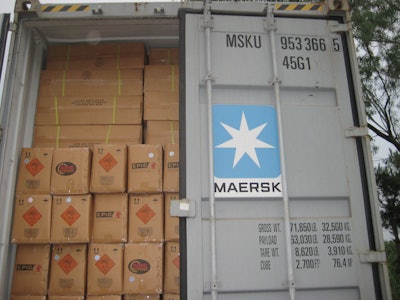
COVID-19 and the six-day-long grounding of container ship Ever Given. Chinese port closures and the war in Ukraine. Businesses have experienced supply chain disruption at every turn in recent years. In this highly unpredictable environment, it’s not just freight industry professionals who’ve struggled to predict supply timeframes, it’s been a challenge for crime syndicates too.
On its face, this may seem like a silver lining but the reality is it’s introducing risk into workplaces. Gangs are highly motivated. When one door closes to them, they incentivize vulnerable employees to open another.
Employees who feel valued by their employers and enjoy a strong connection to their workplace community, however, will be far less likely to collude with the criminal element.
Strong teams crucial in the face of low recovery rates
Once stolen, cargo is challenging to locate and secure. In fact, of cargo thefts reported to the FBI in 2018, only 22.8% were recovered. In 2019, the most recent FBI data available, the recovery rate plummeted to 2.9%.
Stretched thin by the pandemic, non-violent cargo thefts simply weren’t a priority for law enforcement and motor carriers would be wise not to count on their investigative resources.
When you consider that more than 60% of freight in transit today is under or uninsured, the impact of cargo theft grows more significant. In the event of an unrecovered loss, costs mount up fast: the value of the lost load, business interruption, expedited replacement costs, and damage to brand and customer loyalty to name a few.
It’s why reinforcing a company’s first line of defense — its people — is so crucial.
Understanding psychological and social influences is key. Effectively mitigating employee collusion begins with an understanding of what makes employees vulnerable to criminal overtures.
To start, freight industry businesses must recognize that, whether consciously or unconsciously, employees who engage in criminal behavior often feel powerless. With mental health at an all-time low and the pandemic leveling massive physical, financial and emotional strains, powerlessness is pervasive. For those who also feel taken advantage of by their employers, the ethical barrier to collusion can become fuzzy.
Relationships have also become increasingly strained over the last two-and-a-half years and workplace culture has suffered as a result. Not only has the pandemic left people feeling isolated, but the rise in mergers and acquisitions has fractured teams. Today, employees feel more disconnected from their employers – or worse: undervalued and unsupported. Seeking justification for collusion, workers may see theft as an act against the organization, which doesn’t require the same moral gymnastics as taking from a person.
The good news: Investing in workplace culture can foster employee resilience, nurturing a workforce that’s not only more productive but also more committed to doing what’s right for the business.
Four simple ways to create strong workplace culture
Want to improve the employee experience? Take your cue from the world’s most successful cultures. Healthy longevity hotspots like Okinawa, Japan; Sardinia, Italy; and Nicoya, Costa Rica, reveal strong social cohesion — communities act out of care for one another and create strong support networks. Likewise, happiness hotspots like Denmark and Singapore report feeling meaningfully engaged in their lives and frequently experiencing joy. These communities all thrive on core values of trust, honor and respect for self and community, and what they do well can be replicated in the workplace.
It all begins with a commitment to building supportive respectful relationships throughout the organization – a commitment that must be genuine. People can tell when their employers care and when they're simply paying lip service to workplace culture.
Knowing employees crave trust and mutual respect in the workplace, employers can deliver when they ensure their workers feel valued and are recognized and acknowledged for their effort.
1. Implement workplace wellness checks
Mental health is taking a beating and people may feel powerless in the face of an unrelenting onslaught of personal and professional obstacles.
Workplace wellness checks are an effective way of offering the support employees need. To be clear, these one-on-one calls should have absolutely nothing to do with work. The focus is on building personal connections and creating space for employees to be heard with kindness and compassion. By being vulnerable and sharing relatable challenges, those leading the calls can nurture this trust. As trust grows, employees may be more inclined to reveal an illness or financial struggle they’re facing. The company can then step in and provide needed support, perhaps offering paid mental health days to an overwhelmed employee.
Prompting employees to share three things they’re grateful for that day, or what they enjoy most in terms of their personal and team contributions in the workplace, can be very revealing while also providing avenues to build trust and community.
2. Host company-wide town hall meetings
As companies grow, employees can feel disconnected from the company mission and see themselves as an invisible cog in a massive machine. Town halls give companies the opportunity to demonstrate they care through transparency, connection and celebration.
Effective town halls bring together teams from across the organization and give them the space to talk about their work, the challenges they face, how they’re overcoming them and ways they’re contributing to the company. They celebrate team success, showcase employees up and down the company hierarchy and help employees feel valued. Through these meetings companies can foster a sense that everyone has a meaningful role to play.
3. Hold regular roundtable discussions
Small group roundtable discussions can be an energizing way to nurture connection while also opening a window into the ways culture can be improved.
Take a day and bring together people who don’t ordinarily interact. Engage them in conversations about community, wellness, workplace culture – even cargo theft. I recommend no more than five people per table. These sessions create opportunities for people to see one another with more empathy, hear unique perspectives and create the conditions for community, not to mention innovation, to take root.
4. Invest in people and what they care about
Employees who struggle may feel invisible to their peers and supervisors and taken advantage of by their companies. By investing time and resources in them companies can combat that perception.
Throughout the year, engage in community-building activities inside and outside the office. Events like sports outings, charity runs, crafting meetups and picnics can foster joy and connection. Inviting families to join in can also demonstrate the company’s care for workers’s personal lives, deepening connections further.
Don’t stop there. Support charities employees care about and celebrate their hard work through bonuses, lunches and thoughtful gifts that acknowledge birthdays and other milestones.
These simple gestures help employees feel valued. Improving workplace culture is the surprising cargo theft prevention strategy that pays big dividends.
Johnny McCord is Loadsure's CEO & Founder whose end-to-end digital cargo insurance solution, Loadsure, was the only Lloyd’s of London coverholder approved in 2019. It was also a Lloyd’s Lab selection, 2021 InsurTechNY Early-Stage InsurTech Competition winner, and runner-up for Insurance Insider’s 2020 Disruptor of the Year Award. Previously a cargo broker with Lochain Patrick and a founding member of Roanoke International, Johnny brings 18 years of cargo broking experience to the fore.
Rhonda Bompensa-Zimmerman, Ph.D is GlobalTranz Director of Wellness and Fitness and health psychology expert passionate about sharing the behavioral strategies that help people live more joyful and meaningful lives. With over 20 years of experience as an educator, community health programming facilitator, corporate and collegiate director, and health advocate for special populations, she now serves as Director of Wellness and Fitness for third-party logistics provider, GlobalTranz, where she implements evidence-based programs that support employee mental, physical, and social health, as well as personal and professional success.











